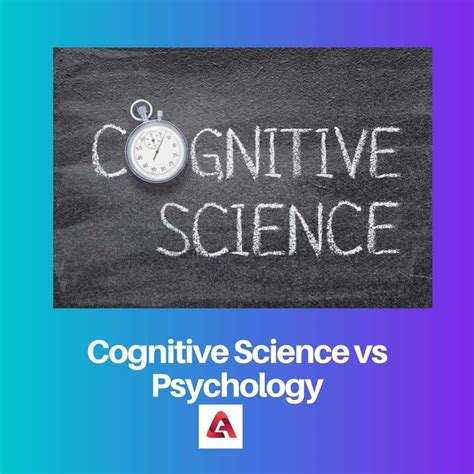Introduction
Cognitive science and cognitive psychology are two highly interconnected fields that explore the inner workings of the human mind. While they share some commonalities, they also differ in their approaches, methodologies, and areas of focus. This article delves into their distinctive features, exploring their motivations, pain points, applications, and the ways they contribute to our understanding of cognition.

Cognitive Science: A Multidisciplinary Endeavor
Definition: Cognitive science is a broad and interdisciplinary field that investigates the nature of the mind and its relationship to cognition, perception, and learning.
Motivations: Cognitive scientists seek a comprehensive understanding of mental processes and their underlying mechanisms. Their research is driven by a desire to unravel the complexities of human cognition and how it shapes our behavior and interactions with the world.
Pain Points: One of the main pain points in cognitive science is the vast scope and complexity of the human mind. Researchers must navigate a diverse range of disciplines, from psychology and neuroscience to computer science and philosophy.
Applications: Cognitive science has far-reaching applications in areas such as artificial intelligence, human-computer interaction, education, and medicine. By understanding the principles of cognition, researchers can develop tools and technologies to improve problem-solving, decision-making, and communication.
Cognitive Psychology: The Science of Mental Processes
Definition: Cognitive psychology focuses specifically on mental processes, such as attention, memory, thinking, language, and emotion.
Motivations: Cognitive psychologists are interested in understanding how these processes work, how they are organized, and how they contribute to our behavior.
Pain Points: A challenge in cognitive psychology is the difficulty of studying internal mental processes objectively. Researchers rely on indirect measures, such as reaction times, error rates, and brain imaging techniques.
Applications: Cognitive psychology findings have implications for education, mental health, and legal settings. For example, research on memory and attention has informed the development of effective teaching methods and cognitive rehabilitation programs.
Distinctive Features: A Comparative Analysis
| Feature | Cognitive Science | Cognitive Psychology |
|---|---|---|
| Scope | Interdisciplinary, encompassing multiple fields | Focuses specifically on mental processes |
| Methodology | Diverse approaches, including computational modeling, behavioral experiments, and brain imaging | Primarily relies on behavioral experiments and some neuroimaging techniques |
| Research Focus | Nature of the mind, cognitive mechanisms, AI development | Investigation of mental processes, their organization, and behavior |
| Applications | Wide-ranging, including AI, HCI, and medicine | Education, mental health, legal settings |
Synergy and Convergence
Cognitive science and cognitive psychology often work synergistically, combining their strengths to advance our understanding of cognition. For example, cognitive science provides computational models that can simulate cognitive processes, while cognitive psychology offers empirical data to validate and refine these models.
Over time, there has been a convergence between the two fields, with cognitive psychologists embracing more interdisciplinary approaches and cognitive scientists recognizing the importance of psychological processes in understanding the mind.
Pain Points and Motivations
Pain Points:
- Cognitive Science: Complexity and vast scope, requiring expertise in multiple disciplines.
- Cognitive Psychology: Challenges in objectively measuring internal mental processes.
Motivations:
- Cognitive Science: Desire for a comprehensive understanding of the mind and its mechanisms.
- Cognitive Psychology: Interest in understanding how mental processes work and how they shape behavior.
Tips and Tricks for Success
Cognitive Science:
- Develop a strong foundation in multiple disciplines, from psychology to computer science.
- Collaborate with researchers from different fields to gain diverse perspectives.
- Stay updated on the latest technological advancements and research findings.
Cognitive Psychology:
- Master experimental design and statistical analysis techniques.
- Leverage neuroimaging and other indirect measures to study mental processes.
- Collaborate with clinicians and educators to apply findings to real-world settings.
Examples for Practitioners
- Cognitive Science: Designing AI systems that mimic human cognitive abilities, developing brain-computer interfaces for medical applications.
- Cognitive Psychology: Developing educational interventions to improve memory and attention, designing workplace training programs to enhance decision-making.
Conclusion
Cognitive science and cognitive psychology are complementary fields that offer valuable insights into the complexities of the human mind. By understanding their distinctive features, methodologies, and pain points, researchers can leverage their strengths to advance our knowledge of cognition and its applications in various domains. As technology and research continue to progress, the convergence between these fields promises even greater breakthroughs in the future.
